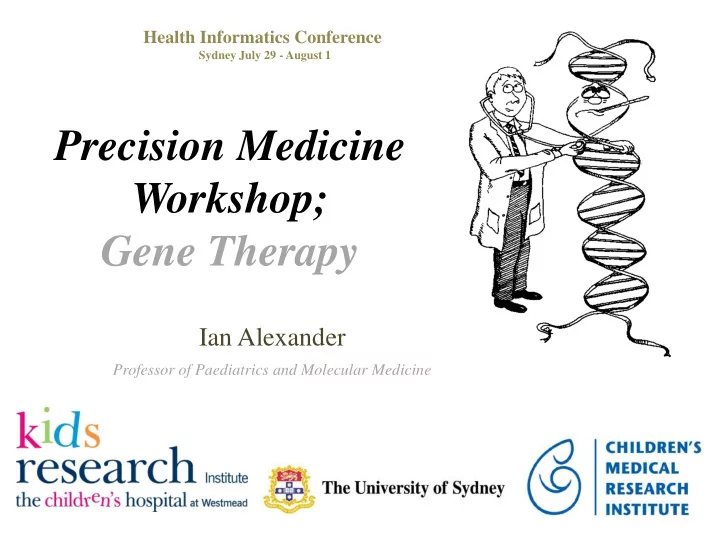

Health Informatics Conference Sydney July 29 - August 1 Precision Medicine Workshop; Gene Therapy Ian Alexander Professor of Paediatrics and Molecular Medicine
Just the beginning…….
The Premise of Precision Medicine Human Genetic Variation • On average there are 20 million differences in the genomes of any two people • In excess of 300 million genetic variations are known in the human population • The average person has approximately 200 faulty genes
Precision Medicine: A story of three revolutions • The recombinant DNA revolution • The DNA sequencing revolution • The genome engineering revolution
The recombinant DNA revolution (early 1970s onward) “molecular cut, paste and copy”
The DNA sequencing revolution (1977 onward) “ We are here to celebrate the completion of the first survey of the entire human genome. Without doubt the most important, most wondrous map ever produced by human kind.” Bill Clinton, June 26 th 2000 The inside story of how These bitter rivals mapped our DNA, the historic feat that changes medicine forever
The genome engineering revolution (early 2000s onward) user-designed nucleases
Exciting times! Medical Implications of Progress in Genomics Knowledge Diagnosis “gap” Progress Treatment Time
Translational challenges Gene discovery (variants of unknown significance) Functional genomics Health Impact Prevention and Therapy Pharmacogenomics Molecular, gene and cellular therapies
Evolving therapeutic strategies Gene mRNA Protein Cell Tissue/organ
Gene therapy “the use of genes as medicine” “ Simple in concept, complex in practice ”
Gene Therapy Clinical Trials Approved Worldwide 1989-2017 www.wiley.co.uk/genmed/clinical
Gene Therapy gene addition versus gene repair
A Milestone in Medical History - Science (2000), 288: 669-672
Pathophysiology of SCID-X1 Mutations in IL2RG ( g c) • This transmembrane The g chain of this Defective T cell & NK cell protein is defective receptor is common to IL-2,-4,-7,-9,-15 & 21R differentiation • Spontaneous reversion events known to provide cells with a selective advantage in vivo
Chimeric Antigen Receptor T-cell (CAR-T) Immunotherapy for Cancer
Autologous therapy Also bespoke at the level of the target tumour-associated antigen
The Future – Genome editing
The Future – Genome editing
Take home messages • Personalized medicine has immense potential that is just beginning to be realised • Requires deep knowledge of the functional significance of human genetic variation • Will involve an increasing number of highly bespoke patient-specific interventions • Will present challenges for bio-therapeutic product manufacture • Will present challenges to regulators, such as the TGA
Recommend
More recommend